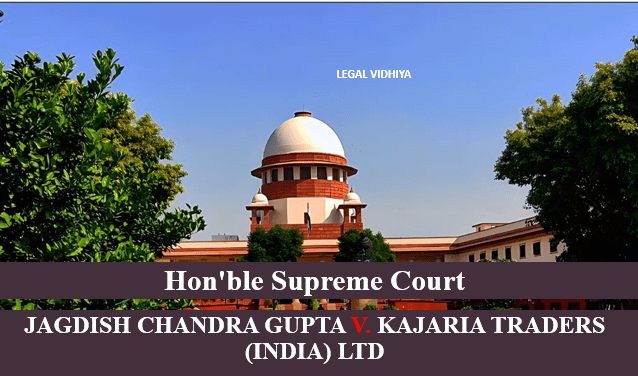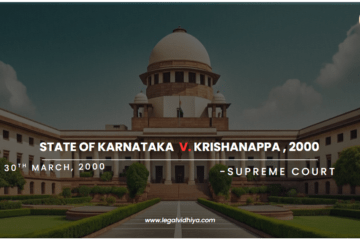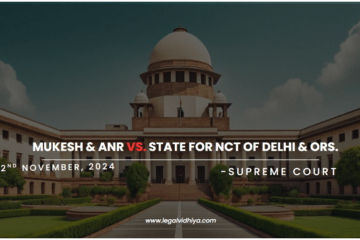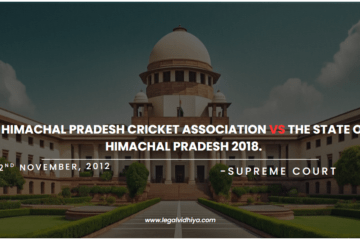
| Case Name: | Jagdish Chandra Gupta v. Kajaria Traders (India) Ltd |
| Citation | MANU/SC/0047/1964 |
| Court Name: | Supreme Court of India |
| Date decided: | 29.04.1964 |
| Coram: | K.C. Das Gupta, K.N. Wanchoo, M. Hidayatullah and N. Rajagopala Ayyangar, JJ. |
| Rules/Statutes/Acts | Arbitration Act, 1940 [repealed] – Section 8, Arbitration Act, 1940 [repealed] – Section 8(2); Indian Partnership Act, 1932 – Section 56, Indian Partnership Act, 1932 – Section 69, Indian Partnership Act, 1932 – Section 69(3); Presidency Small Cause Courts Act, 1882 – Section 19 |
| Cases Referred: | Babulal Dhandhania vs. Gauttam and Co. MANU/WB/0145/1950 |
| Appellant: | Jagdish Chandra Gupta |
| Petitoner: | Kajaria Traders |
| Civil Appeal no: | 791 of 1962 |
| Cases Overruled: | Kajaria Traders (India) Ltd. vs. Foreign Import and Export Association, MANU/MH/0013/1961; Ram Lal Harnam Dass vs. Bal Krishen and Ors., MANU/PH/0069/1957 |
| Disposition: | Appeal Allowed |
Introduction:
A partnership is formed by a contract and is regulated by the Partnership Act of 1932. The partnership is also controlled by the basic provisions of the Indian Contract Act in areas where the Partnership Act is silent. It is specifically stated that any provision of the India Contract Act that is not abolished will be relevant to Partnership until and until such provision is in conflict with any provision of the Partnership Act, 1932. Contractual standards governing contract capacity, offer, acceptance, and so on will apply to the partnership as well. However, the regulations governing the minor’s status will be governed by the Partnership Act of 1932, as Section 30 of the Act addresses the position of the minor. It is a commercial organization formed by two or more people who have agreed to work collaboratively to carry out a business in order to benefit. It is an extension of a sole proprietorship. It is preferable to sole proprietorship since sole proprietorship is carried out by someone with limited capital and limited ability. Due to the limited resources of a single individual running a company on their own, a bigger company requiring more resources and investment than the sole proprietor has cannot be considered. In contrast, a partnership is formed when a number of partners pool their capital to form an agreement and carry out a company together.
Section 69 of the Indian Partnership Act of 1932 provides a full description of the penalties of failing to register a partnership. They are as follows:
1] No civil court action by the firm or other co-partners against any third party.
If the firm is not registered, the firm or any other person acting on its behalf cannot sue a third party for breach of a contract entered into by the firm. Furthermore, the individual submitting the suit on behalf of the firm must be listed as a partner in the firm’s registration.
2] No relief for partners for claim set-off
Any action launched against the firm by a third party that exceeds Rs. 100 cannot be put off by the firm or any of its partners unless the firm is registered. Other proceedings to enforce rights resulting from the contract are also barred.
3] A dissatisfied partner may not sue the other partner or the firm.
If the firm is not registered, a partner or anybody acting on his behalf cannot pursue legal action against the firm or any partner (or person claiming to be a partner). However, if the firm is dissolved, such a person may sue the firm for the dissolution of its accounts and the realization of its assets.
4] A third party may sue the company.
Even if the firm is not registered, a third party may file a lawsuit against it.
It is also crucial to remember that, notwithstanding these limitations, a firm’s failure to register does not impair the following rights:
- A third party’s right to sue the firm or any of its partners.
- Partners’ right to sue the firm for dissolution or account settlement (in the event of dissolution)
- The authority of the Official Assignees and the Receiver of Court to release the bankrupt partner’s property and file a lawsuit.
- The firm’s and partners’ right to sue or seek set-off of the suit’s worth does not exceed Rs. 100.
FACTS OF THE CASE:
From January to June 1956, M/S Kajaria Traders (India) Ltd. and Messrs. Foreign Import and Export Association (controlled by Jagdish C. Gupta) collaborated to export manganese ore to Phillips Brothers (India) Ltd., New York. Each partner committed to providing a specified amount of manganese ore. They had an agreement that said that if they disagreed, they would go to arbitration.
Later, when Jagdish was unable to complete his part, the firm wrote to him, appointing an arbiter named Mr. Kolah. The corporation requested that Jagdish either consent to Mr. Kolah’s arbitration or pick his own arbiter. He, on the contrary, was skeptical. On March 28, 1959, the firm requested Mr. Kolah or another arbitrator under Section 8(2) of the Indian Arbitration Act, 1940. Jagdish filed an objection, arguing that (i) Section 8(2) of the Indian Arbitration Act did not apply because it was not expressly stated in the arbitration clause cited above that the arbitrators were to be chosen by consent of the parties, and (ii) Section 69(3) of the Indian Partnership Act, 1932 barred the petition because the partnership in question was not registered.
The Bombay High Court ruled in favor of Kajaria Traders after hearing the matter between them and Jagdish. As a result, Jagdish Chandra Gupta filed an appeal with the Supreme Court.
ISSUES AT HAND:
- Whether the Court has the authority to appoint the arbitrator without the assent of the parties under Section 8(2) of the Indian Arbitration Act, 1940.
- Is the petition barred by Section 69(3) of the Indian Partnership Act of 1932 because the partnership was not registered?
- Is the current process one to enforce a claim resulting from the parties’ contract?
JUDGMENT:
The court emphasized that the action under Section 8 of the Indian Arbitration Act, 1940 stemmed from the arbitration clause in the partnership agreement.
As a result, the court decided that the continuing legal action attempted to enforce a contractual right, whether the entire contract or simply the arbitration clause was considered.
By including an arbitration clause in the agreement, the court determined that the parties had already reached an agreement on resolving the dispute through arbitration.
According to the court, “Since the arbitration clause formed a part of the agreement constituting the partnership it is obvious that the proceeding which is before the Court is to enforce a right which arises from a contract” . Whether one looks at the contract as a whole or just the arbitration clause, it is impossible to believe that the capacity to proceed to arbitration is not one of the rights based on the parties’ contract.
The terms “a right arising from a contract” in Section 69(3) of the Indian Partnership Act, 1932 are adequate in either sense to cover the current issues.
ANALYSIS:
Ejusdem Generis is Latin for “of the same kind.” Unless the situation necessitates otherwise, general terms should be given their natural meaning like all other words. However, when a general word is followed by particular words from another class, the general word may be assigned a restricted meaning from the same category. The general statement derives its meaning from the preceding specific expressions since the legislature has demonstrated its aim to that end by using specific words from a specific genus. This approach is only applicable to general words after less general words. This rule is inapplicable if the individual words do not belong to a distinct Genus. As a result, if an umbrella term follows only one specific word, that single specific word does not represent a different genus, and the Ejusdem Generis criterion cannot be used in such a scenario. Exceptional stray examples are known, however, when the courts have defined one-word genus and the general word following such a genus has been assigned a restricted meaning. If the individual words exhaust the whole genus, the general word that follows these particular words is interpreted as encompassing a bigger genus. The principle of Ejusdem Generis does not have a general application. If the context of legislation precludes the use of this rule, it has no bearing on the interpretation of broad words. The Noscitur a Sociis principle is a construction guideline. It is one of the linguistic standards employed by courts to interpret legislation. This indicates that the words immediately around an ambiguous word or phrase should be used to ascertain its meaning. In other words, the company a word keeps determines its meaning.
The term ‘other process’ in Section 69 of the Partnership Act, 1932 was considered as not constituting a genus under ejusdem generis in Jagdish Chandra Gupta v. Kajaria Traders (India) Ltd. When it comes to a question about the application of special and general laws in the same case, the Court of Law must assess the nature of the case and the concerns. If there is a disagreement between the two separate laws, then there must be an examination on the Legislature’s restrictions and exceptions. However, an examination of the same reveals that, in most cases, the Court lays a larger focus on the application of special law rather than general law. In Jagdish Chandra Gupta v. Kajaria Traders (India) Ltd., the terms ‘or other procedure’ in the definition of ‘a suit of set-off or other proceeding to enforce a right arising from contract’ contained were interpreted. Section 69 of the Partnership Act of 1932 was at work. Because the preceding phrases /a claim of set off did not comprise a genus, the Supreme Court declined to apply the principle of Ejusdem Generis. The court further stated that when phrases indicating specific classes are followed by broad words, the application of Ejusdem Generis or Noscitur a Sociis is not always required. Before the general words may be interpreted in this manner, a genus must be formed or a category must be disclosed with reference to which the general words can and are construed.




0 Comments